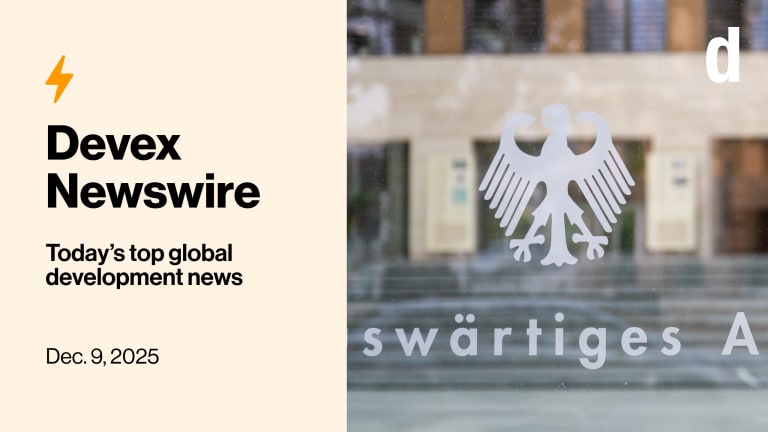
As Western nations move to isolate Russia in the multilateral sphere over its war in Ukraine, the European Union has said it won’t invite Russia to a pledging conference on the Syrian conflict.
This is a preview of Newswire
Sign up to this newsletter for an inside look at the biggest stories in global development, in your inbox daily.
Today we’re also looking at why Lithuania wants to join the aid donors club, and sharing April’s biggest executive appointments in development.
In Ukraine, the echoes of Russia’s involvement in Syria are only growing louder. Russia joined the Syrian conflict in September 2015 on the side of the country’s President Bashar Assad. There, Russia has been accused of war crimes for indiscriminately bombing civilians, hitting schools, hospitals, and vital infrastructure; spawning a massive refugee crisis; and besieging Aleppo — parallels which can be seen in Mariupol and other Ukrainian cities today.
Now, the EU will not invite Russia to a pledging conference on the Syrian conflict next week. An EU spokesperson tells my colleague Vince Chadwick that Moscow’s aggression in Ukraine shows it lacks “a genuine interest to contribute to peace in the world.” That description of Russia will come as little surprise to Syrians, as one U.K.-based advocacy group pointed out.
The annual event “features governments, international organizations, and civil society groups and provides a platform for Syrians and the region to be heard,” Vince writes. Russia has been invited to previous Brussels conferences on Syria despite being party to the war, though it has not pledged significant humanitarian aid.
The United Nations, which has co-hosted the event in the past, will not do so this year. The conference also comes amid growing questions about Russia’s position as a permanent member of the UN Security Council — which gives it veto power and weakens the U.N.’s ability to hold it to account.
Exclusive: EU says Russia not invited to Brussels conference for Syria
ICYMI: How Ukrainian civil society is documenting alleged Russian war crimes
Financial planning
“We are trying to help the world understand that it still is in a moment where it can design a response rather than simply reacting by default.”
— Achim Steiner, administrator, United Nations Development ProgrammeThe number of least developed countries facing debt distress is nearly unprecedented since the Second World War, Steiner tells my colleague Adva Saldinger. UNDP is working with countries to develop financing strategies that can help them cope with the overlapping crises.
UNDP chief: Amid geopolitical paralysis, financing is acute challenge
+ Sign up for Devex Invested, a Tuesday newsletter on how business, social enterprise, and development finance leaders are tackling global challenges.
Join the club
Lithuania wants to be the 31st member — and first Baltic member — of the OECD’s Development Assistance Committee, the international group that sets global aid spending rules.
In an email to Vince, the Lithuanian foreign ministry cited the country’s policy expertise in “energy independence and diversification, digital transformation,” and the “fight against corruption and disinformation.”
“Therefore we believe that Lithuania’s contribution could help the international organisations such as OECD to address the new geopolitical challenges, especially the war consequences in Ukraine, by adjusting and adopting respective policy tools,” they write.
Read: Why Lithuania wants to join the OECD aid donor club (Pro)
+ Devex Pro subscribers can also read a preliminary analysis of the total aid spending of DAC member countries in 2021, and an interview with DAC Chair Susanna Moorehead.
Connect the dots
The U.S. Agency for International Development has invited the private sector to invest in digital services for people in underserved countries via Digital Invest. The new blended finance program aims to mobilize private capital for internet service and financial service providers in low- and middle-income countries.
“In its first year, USAID will provide $3.45 million in grants, with the goal of mobilizing nearly ten times that amount, or $335 million, in private capital, to benefit populations that have been left out of the digital economy,” my colleague Catherine Cheney writes.
Read: USAID initiative is mobilizing the private sector to fund connectivity
Pro top 5
In the last month, the work of our newsroom has ranged from an in-depth look at Prince Harry and Meghan’s Archewell Foundation to the news that DT Global would triple in size after two acquisitions. Also don’t miss why drones can’t be used to deliver humanitarian aid in Ukraine, funding insights, and what the French presidential election could mean for development aid.
Take a look: April’s top reads
+ Try out Devex Pro for free for 15-days to access our exclusive content, data-driven analysis, and essential insights.
Who’s who
A leadership transition at the OECD’s Development Co-operation Directorate, Dr. Helene Gayle’s new job, and the Clinton Health Access Initiative’s new chief executive.
Catherine has this rundown for Pro subscribers on April’s biggest development appointments.
In other news
The U.N. is appealing for $4.3 billion to help some 17.3 million people in Yemen. [UN News]
The U.S. is planning to invite Pacific island leaders to Washington, D.C. later this year in a push to build stronger diplomatic ties in the region. [Reuters]
The drought in Ethiopia is pushing girls into early marriage, UNICEF has warned. [The Guardian]
Sign up to Newswire for an inside look at the biggest stories in global development.








